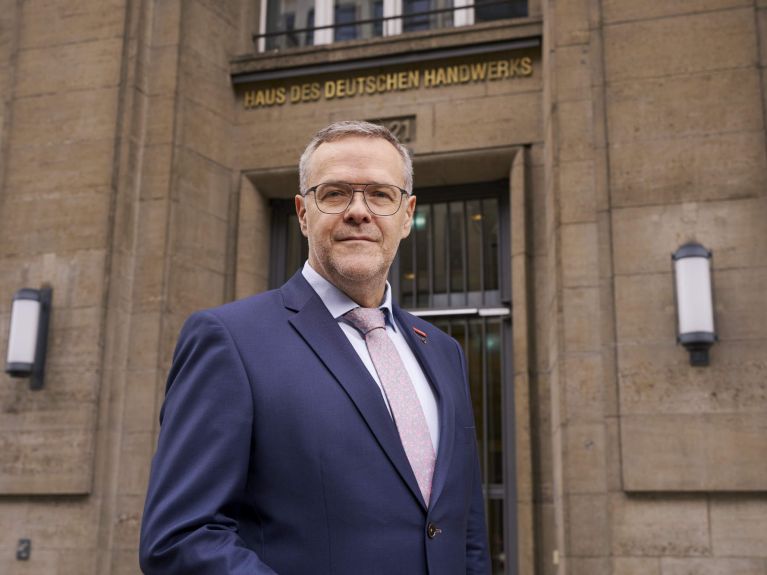“Centuries-old traditions combined with state-of-the-art technology”
Jörg Dittrich, a master roofer, qualified engineer and president of the German Confederation of Skilled Crafts, is optimistic about the future of skilled crafts.

Mr Dittrich, why is it worth training and working in the skilled crafts in Germany?
Training and working in skilled crafts offers secure future prospects: not only are the skilled crafts an important driver of growth and prosperity in Germany; with over a million firms, they also account for a large number of the country’s small and medium-sized businesses. Demand for qualified skilled workers is high and the skilled crafts professions are vital when it comes to the forthcoming transformation processes - such as climate change mitigation, the energy and mobility transition and the supply of artisanal foods, services and health products. Even in the future, AI will not be able to replace a bricklayer or hairdresser. A job in the skilled crafts is a secure job, in other words.
Even in the future, AI will not be able to replace a bricklayer or hairdresser.
Furthermore, working in the skilled crafts offers opportunities for personal development and creatively deploying one’s own talents: there is an impressive range of over 130 professions - in the construction industry for example, in the food and healthcare sectors, or in creative areas such as arts and crafts. Attractive potential earnings are another good reason: even while they are still doing their apprenticeship, young people earn their own money. After qualifying, many professions in the skilled crafts offer good salaries and numerous advancement opportunities, either by doing further training to acquire a master craftsman’s diploma - which is equivalent to a university bachelor’s degree - or by setting up one’s own firm.
What sets German skilled crafts apart on the international market?
German skilled craftspeople enjoy an outstanding reputation on the international market and are renowned for being highly competitive, delivering quality work on schedule and being service-oriented, reliable and flexible. Centuries-old traditions are combined with state-of-the-art technology to satisfy the requirements of a constantly evolving market.
Sustainability is becoming increasingly important.
Germany is a technology leader in many skilled crafts: be it in the automotive industry, mechanical or electrical engineering, German products and services often set global standards. Many skilled crafts firms have years of international business experience and some have high export quotas. They are able to meet individual customer needs and offer bespoke solutions. This flexibility and their high degree of customer orientation are key competitive advantages on the international market. Sustainability is becoming increasingly important. Many skilled crafts firms use resources sparingly and take protecting the environment seriously. This is in line with current trends and an important factor in terms of international recognition.
New developments in technology and artificial intelligence are constantly changing the world of work. How are the skilled crafts adapting, and what will skilled crafts look like in the future?
For centuries, skilled crafts have adapted continuously to new developments and have actively helped shape the future. Many firms use modern technologies and digital tools to optimise their work processes. Furthermore, skilled crafts professionals cooperate with research institutions, universities and technology companies. This cooperation fosters the sharing of knowledge, enables access to innovation and at the same time guarantees practical applicability. From the use of 3D printers and AI-controlled machines to digital planning and calculation programs – digitisation is already penetrating every area of the skilled crafts. To satisfy the future requirements of technological developments, skilled crafts businesses and training centres are continually investing in vocational training and continuing education. Apprenticeship programmes are being adapted to ensure that trainees are taught the skills and knowledge they need. This is giving rise to entirely new professions, such as electronic engineers for building system integration. Though the future cannot be predicted in any linear way, one thing is certain: the skilled crafts of the future will be more digital, more interconnected and even more sustainable, without losing sight of their traditional strengths.
_____________________________________
Jörg Dittrich, a master roofer from Dresden, has been president of the German Confederation of Skilled Crafts since 1 January 2023.


